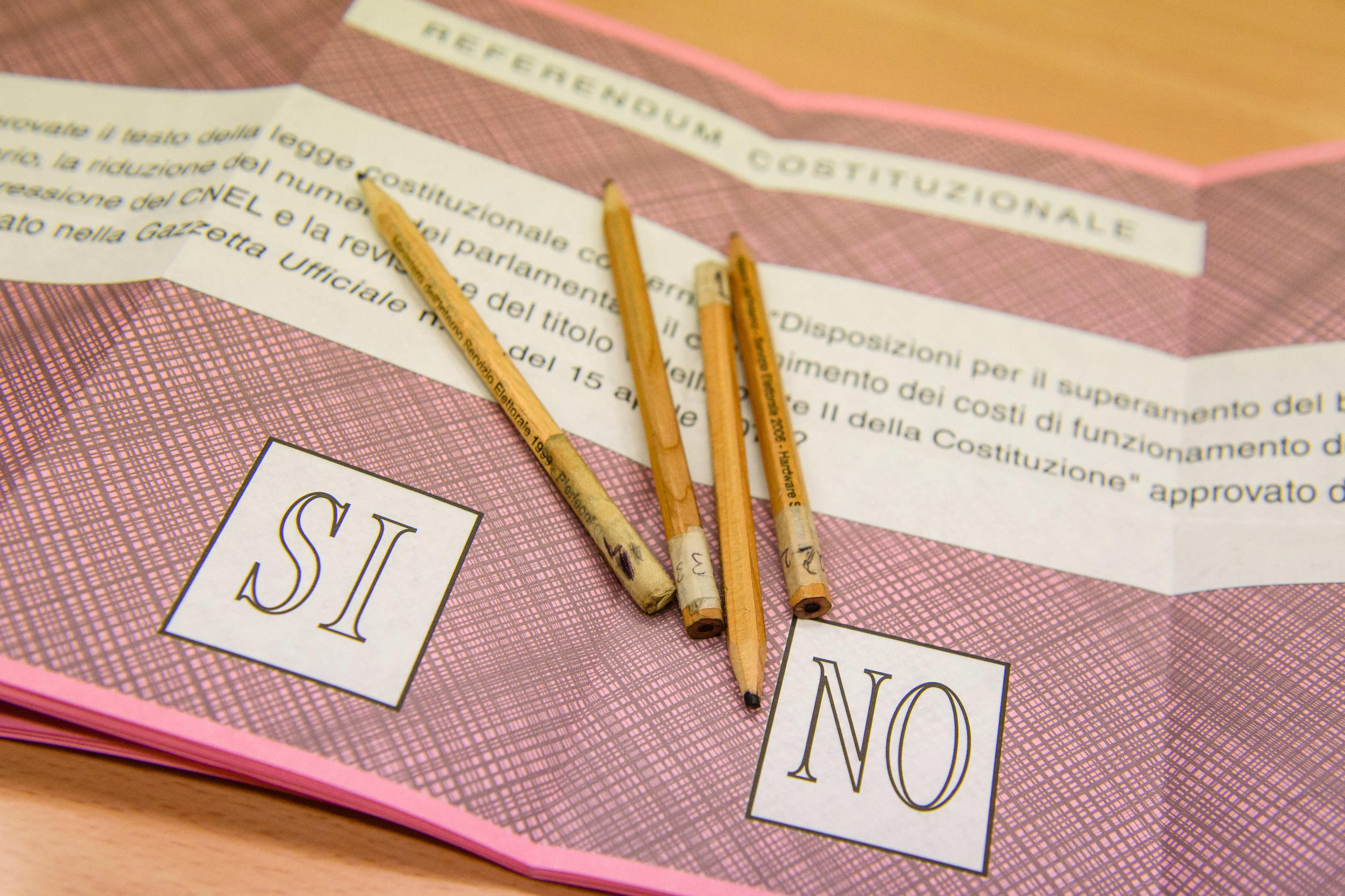The Future of democracy: Nice talk and ugly games
Ahead of the World Economic Forum next week in Davos, we hear warnings of slow economic growth, rising inequality, wild weather, data-fraud and forced migration, just to name a few. There is a president-elect with zero government experience taking over across the Atlantic just in a few days from now, writes Bruno Kaufmann.
However, these are smaller dams in a much, much larger river. Here is a fact you rarely hear:
Never before in history have so many individual people had a say in popular votes as they did last year, in 2016.
According to the think-tank Freedom HouseExternal link last year 40% of the global population lived in “free” societies, while 24% lived in partly free countries and the rest, 36% under unfree regimes.
Sixteen years ago, at the millennium, these numbers looked quite similar, with a share of 38% in free societies, 25% in partly free and 37% in unfree countries. To talk about a big retreat of democracy worldwide – as some commentators are doing – is not really backed up by the numbers.

To the contrary, the evidence suggests that democracy, in many places around the world, has been deepening, and taking firmer root. According to International IDEAExternal link – a global, governmental democracy support agency based in Stockholm – more than 80% of all countries around the world today have some form of participatory and direct democracy.
As environmental protection, energy, water, peace, security and economic growth have become truly transnational issues, it is no longer enough to gather ministers from a few nation-states in your region – if you want to exercise and secure democracy.
The democratic stakes are much bigger, as they are global.
Democracy is at stake. As always, since the great idea of people power turned up for the first time, more than 2,000 years ago.
There have always been nice talks and ugly games around democracy – as the outgoingExternal link and incomingExternal link US presidents offered some impressive proofs of these recent days.
Democracy is a struggle, an unfinished journey of great, but seldom fulfilled promises, a never ending story of encouraging successes and dispiriting setbacks.
swissinfo.ch publishes op-ed articles by contributors writing on a wide range of topics – Swiss issues or those that impact Switzerland. The selection of articles presents a diversity of opinions designed to enrich the debate on the issues discussed.
Here are the main challenges and opportunities ahead.
Plurality
The first challenge is plurality. It has been argued, that democracy is the only government, where there is no guarantee that a society is run by a minority.
In other words: only in a democracy is there a fair chance that a majority of voters are deciding the main elected offices and – by forms of direct democracy – subscribing to the key decisions within a jurisdiction.
Recently however many democracies have had problems finding simple majorities. In the United States, the most recent presidential election was primarily a race against candidates – not in favour of them. The result was, that the one candidate who lost the popular vote by almost three million votes, won the presidencyExternal link.
The US is not alone: In Britain it is not uncommon that a plurality of just a third of the popular vote produces an absolute majority at parliament.
Publicity
Second challenge: publicity. “Fake news“, “post truth“, “trolling“, conversations around the world are filled with such expressions – and in Germany there is the word ‘Lügenpresse’, lying press which surfaces in many internet forums and at rallies.
The point is that the traditional media, which has been an important pillar for a long time in many democratic countries, has lost a lot of ground in the last ten years – much of it because of technological game-changers called internet and smartphones.
While private newspapers and public broadcasters have struggled to reorient their businesses, much of human resources for participation and democratic spaces that media provided have been lost.
New, economically weak and often fragmented efforts within social media to recover such journalistic resources and deliberative spaces have not been able to make up for those weaknesses, creating a true challenge to modern democracy.
Procedures
Thirdly, we have a challenge when it comes to our procedures of democratic agenda-setting and decision-making, which are cornerstones of each and every political and public conversation.
Traditionally, many democracies limited the rights and opportunities of the people to select and elect others to be involved in agenda-setting and decision-making.
Also traditionally private organisations, called political parties, fulfilled the role of bridging the opinions of the many with the decision-making of the few during the times between elections.
All this is not really sufficient any more – as most people in most countries see a growing divide between themselves as voters and their representatives in power. When facing outdated and unresponsive procedures over long time, dysfunctional results are likely and democracy is weakened.
Opportunities
These challenges can be met – by seizing the following opportunities:
First, deliberation is the very heart of democracy. It is the way to share your own opinions and to care about the ones of others.
Deliberation is a very old idea. The Greek statesman Pericles noted already in the year 430 BC that the main difference between a democracy and a non-democracy is that in a democracy, there is a deliberation before decision and that the quality of this deliberation is critical to the quality of the decision.
This idea had and still has huge implications for how we develop our democracies: creating deliberation starts with comprehensive civic education, is encouraged and protected by healthy media and must be secured by a strong judicial control, guaranteeing the basic freedoms that enable us to engage in public deliberations.
Second opportunity: digitalisation. During the French Revolution in the end of the 18th century, just 3% of population was speaking the national language, and basically no infrastructure for transport or communication was available.
Today, the internet offers enormous possibilities to reach out, to interact and to stay in touch. In countries like India, where 20 years ago just 37 million people had access to a phone line, now more than one billion mobile phones are in use.
However, while our private lives and business activities have moved onto the internet, there is a lot of reluctance to do the same with our democracies and elections.
There are good reasons for being careful as hacking is common but a fair share of the resistance to digitalisation can also be traced back to the endemic unwillingness by the already-powerful to share power.
In the near future, we will however need to fully embrace and implement the digital opportunities for democracy step-by-step.
And third: directness. For a host of legitimate and less legitimate reason, many of our political systems are mirroring the past much more than the future.
But that’s a problem, because in modern times, with ever more complex challenges, it’s clear that we need more involvement and participation to make the best decisions.
High-quality decision-making cannot been delivered in a plebiscitary way as populist politicians often pretend. To simply organise a referendum on all issues and to abolish elected offices would not strengthen, but weaken democracy. Why?
Absolute power, whether it is embodied in one president or in the majority of the electorate in a single vote, is not compatible with other fundamental pillars of modern democracy:
Such as the rule of law, the protection of human rights or the delegation of powers. At the same time does such considerations not exclude an embedded, comprehensive and daily involvement of citizens – by initiative and referendum.
On the contrary, in a modern representative democracy representativeness can only gain, if more citizens are engaging in deliberations and participate in decision-making.
In sum: the future of modern democracy needs to be more deliberative, more digital and more direct.
The views expressed in this article are solely those of the author, and do not necessarily reflect the views of swissinfo.ch.

In compliance with the JTI standards
More: SWI swissinfo.ch certified by the Journalism Trust Initiative












You can find an overview of ongoing debates with our journalists here . Please join us!
If you want to start a conversation about a topic raised in this article or want to report factual errors, email us at english@swissinfo.ch.